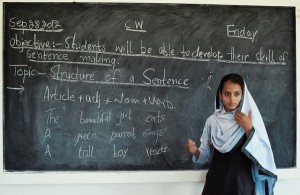MOTIVATION
Human capital is one of the most vital resources to achieve economic development and ensure food security. In the late 1980s in Pakistan, growth in the supply of educated workers was higher than the demand for them in urban areas, while at the same time, a marked increase of educated workers emerged in post-Green Revolution rural areas. However, very little was known about the effects of education on agricultural productivity, or of the consequences of human capital accumulation on non-agricultural productivity and household economic behavior. IFPRI led a microeconomic research project to assess the determinants and consequences of human capital accumulation in rural Pakistan.
RESEARCH RESULTS
The study found that the skills acquired by students in schools in Pakistan’s rural areas increased rural labor productivity. Workers who were educated were likely to be relatively well equipped with productivity-augmenting cognitive skills. Gender was an important determinant of accessing education. When factors such as ability, parents’ education, socioeconomic status, and locality were held equal, girls were found to have a substantially lower probability of attending primary school. Moreover, educated fathers contributed to the learning process of their sons, but not their daughters. Few mothers were educated and their influence on sending their children to school was not significant. These results suggested that a policy emphasis on increasing the educational opportunities for girls would have a positive impact on reducing the gender gap and would also generate more productive workers, both in the short run and for subsequent generations.
OUTCOMES
IFPRI’s study of human capital formation helped place the education of girls at the center of the World Bank-driven development agenda of the mid-1990s, at both the provincial and federal government levels. It also enabled the analysis of several related issues, including the differences, across regions and household income levels, in human capital endowments of children; the effects of school quality and teacher performance on human capital; and the determinants of technical skills in agriculture.



